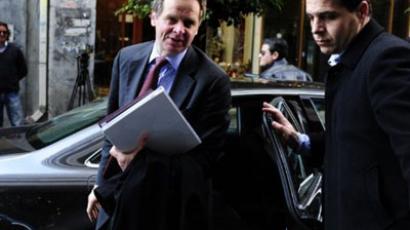Greece talks up prospects as marathon debt talks drag on
Last-ditch debt write-off talks between Athens and its creditors appear to be nearing a conclusion, Greek officials say. Negotiations will continue on Saturday after sides failed to reach an agreement during late-night talks on Friday.
Talks have been ongoing for three days now, and dragged on past midnight into today. Greek Prime Minister Lucas Papademos and Finance Minister Venizelos met with negotiators from the Institute of International Finance – the IIF – which represents some 450 financial institutions.According to reports, negotiations were also held with eurozone officials via a teleconference link.The Greek government met EU and IMF officials face to face on Friday to discuss economic reforms demanded by the two lenders in exchange for bailout aid.Athens is seeking to cut its 350-billion-euro debt by asking creditors to write off 100 billion euro of loans, as well as go ahead with a debt-swap. This will unlock the second bailout package of 130 billion euro, and will be in addition to a 110 billion-euro rescue package that Greece agreed to with the European Union and the IMF in 2010.The atmosphere of the talks was described by officials as “good” and reports suggested that progress had been made. Some differences remained between the two sides on the interest rate of the new bonds Greece will issue.Private bondholders are asking for an average coupon of 4.25 per cent, while Greece, the eurozone and the International Monetary Fund (IMF) are insisting on a 3 per cent rate.Several eurozone countries still maintain that the proposed interest rate is too high. Greece needs an agreement in order to receive the next rescue package. It now looks unlikely that a deal will be reached over the weekend. "Now is the time to act decisively and seize the opportunity to finalize this historic deal and contribute to the economic stability of Greece, the euro area and the world economy," the Institute of International Finance (IIF) said.The negotiations, together with parallel bailout talks with the EU and IMF, are seen as crucial for Greece, and considered its last chance to avoid financial collapse.Failure to agree soon could put Athens at risk of a default in March, dragging the world’s economy into deeper crisis.But Edward Harrison, founder of analysts Credit Writedowns, believes the eurozone is shooting itself in the foot with its approach to the debt crisis.“You have the eurozone and you have the wider EU. It is not about the eurozone in terms of debt. There is imbalance that built up everywhere because ultimately the eurozone caused a cul-de-sac which basically means they have a failed policy in terms of addressing the crisis. They think the crisis is about public sector debt, when in fact it is about private sector debt. That really causes all the same tactics to be implied in terms of austerity budget cuts, etc. And as a result there is lots of unemployment and now the whole thing is going to pieces.”














